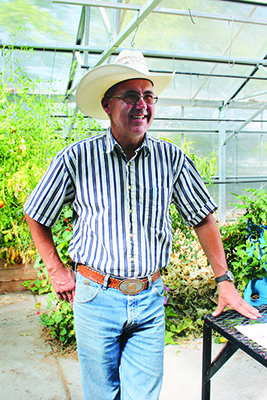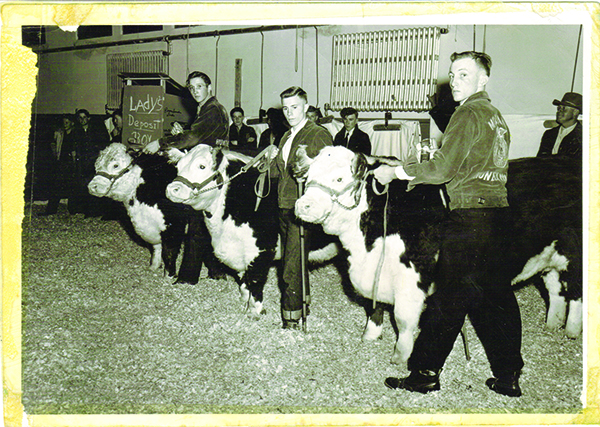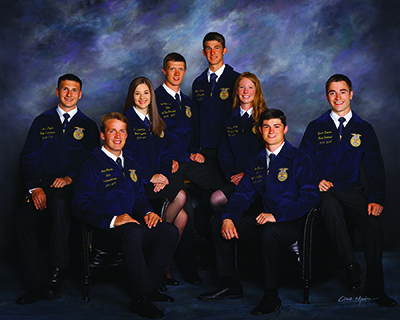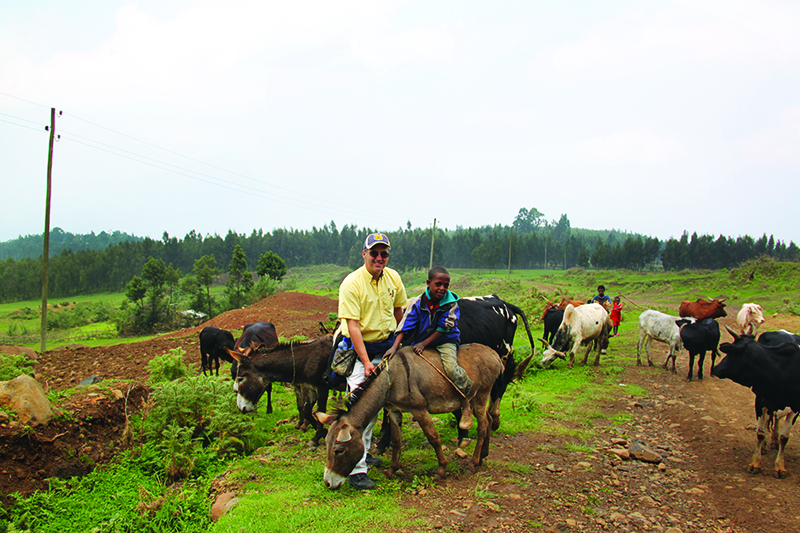Shaping Life into Adulthood
Text and Photography by Suzanne Waring
During the first weeks of August, most public school teachers are catching the last rays of sunshine before heading back to the classroom for another school year. Instead Bill Lombardi is recovering from jet leg after returning from two weeks of work with farmers in the African nation of Malawi through the Farmer-to-Farmer Program sponsored by the United States Agency for International Development. He is also taking part in the county fair of which he is an organizer; he is attending to the daily tasks of being a father to 14 children; and he is seeing to the chores at the school farm while getting ready for a new school year as FFA (Future Farmers of America) instructor at Powell County High School, which is presently in the midst of a major reconstruction project.
That’s a lot of work, but that’s exactly the way Lombardi likes it. Having a father who was a well-respected state advisor for FFA, Bill grew up in Helena, hearing about agriculture and FFA. He joined an FFA chapter when he enrolled in the agricultural college at Montana State University. To fulfill a 2000-hour internship, he managed a farm at Gallatin Gateway for 3 1/2 years and worked as a campus lab assistant. After graduation, he moved to Deer Lodge, Montana, and became the Powell County High School FFA instructor. For thirty years, he has been in Deer Lodge where he built a large home on an acreage that he and his wife, Mary Rose, purchased.

Standing in the greenhouse that he and his students built over four years, Bill Lombardi was honored with the National FFA Teacher of the Year award in 2009.
The Lombardis live the FFA motto: Learning to Do, Doing to Learn, Earning to Live, Living to Serve. Some years ago during a visit to Seattle, a little free time gave the couple the opportunity to review their goals. They told each other they should adopt a child to add to their family of three children. Eleven additional children later, their household is as diversified as the globe since their children were born in South Korea, Ethiopia, Taiwan, China, Haiti, and the United States. During the summer of 2015, twenty-three children were living at their house. Their children’s friends who had been adopted by other families in the United States wanted to come to Deer Lodge to spend some of the summer.
In 2009 Lombardi received the National FFA teacher of the year award. Further acclaim to his success with students is that four of his former students are now FFA instructors.
Powell County High School has an attendance of approximately 190 students. From forty to seventy enroll in the FFA program each year. The school has an Ag-Ed building with shops, a large green house, and a 72-acre farm that has been part of the program for the past 60 years. Sheep, beef cattle, hogs, chickens, dairy cows, and a horse at the farm are taken care of by the students and their teacher. If Lombardi is gone to Ethiopia or Malawi to help farmers learn good agricultural practices in the summer, Mary Rose, the children, and students do the chores at the school farm.
Nationwide, one-third of FFA students are rural, one-third are from small towns, and one-third live in urban settings. Even farm kids may not be familiar with the large diversified garden anymore. “I think it’s important that students know where their food comes from,” said Lombardi. One fall day he took his freshman out to the FFA farm and told them they were going to harvest potatoes. The students looked around and said, “We don’t see any potatoes to pick.” It was right then that Lombardi knew this was a great teaching moment. He showed them that potatoes were a root crop, and the students would dig them. When they saw the first potato, they protested that they weren’t digging potatoes because they were purple. Lombardi explained that potatoes come in many colors.
Lombardi makes certain that all of his students and children learn to cut meat. “Most are hunters, and it’s a skill they will use right away,” he said.

The first unofficial FFA chapter in Montana was at Moccasin. The chapter was organized in 1928. Official state charters were issued in 1930 after the Montana Association of Future Farmers of America received Charter #38 from the national organization.
What FFA students are doing today goes back to 1928 when 33 students from 18 states gathered in Kansas City, Missouri, to form the Future Farmers of America to be an inter-school program. The official uniform of the blue corduroy jacket that is still being used today was adopted in 1933. In 1930, Montana FFA was founded with 26 charter chapters and 443 members. Today, the Montana FFA Association has grown to 4830 members and 90 chapters.
Because it is affiliated with the National FFA organization, Montana FFA members who have placed first in the career development events at the state level may advance to the career development events at the national convention. “Their expenses for trips to these conventions are offset by the Montana FFA Foundation,” said Jaime Edmundson, Executive Director of the Foundation. This is made possible through the support of its 80,000 alumni and businesses around the state.
The number of girls in FFA has grown since they could become full members in 1969. Now 52 percent of all FFA students are girls and more than that percentage hold offices.
Throughout the country FFA is bigger than ever. “Part of the reason for the growth in FFA membership is that there are more agricultural-related job opportunities and careers for these young people than any time in history. FFA gives them a background and puts them on the path to a great future,” said Lombardi.

During their year of service, the eight 2016-2017 Montana FFA state officers travel across the state to interact with members.
Another FFA leader, Jack Larson, who was in the FFA program at Huntley Project High School, believes that leadership development is also a big component of the FFA curriculum. Over the years Larson has used his FFA skills as a public speaker, for networking, and as a parliamentarian. After being the ag-ed FFA teacher at Custer County High School for twenty-one years, he became the ag administrator at Miles Community College for five years. Since then he has embarked on a third career by developing an ag-ed FFA program for the Department of Corrections for the young men at Pine Hills School in Miles City as a first step for developing FFA, where relevant, throughout the correctional system. Ironically, he has been hired by one of his former FFA students. In addition to leadership skills, Pine Hills students learn animal science, mechanics, welding, horticulture, and operation of heavy equipment, such as fork lift, farm tractor, skid steer, and back hoe. Equine therapy is also available to the students.
These teachers are just two examples of the ways former FFA students serve. For eighty-six years FFA has set men—and then women—on the path to lifetime careers. For Bill Lombardi in Deer Lodge and Jack Larson in Miles City, as well as in Cascade, Great Falls, Fort Benton, Stanford, and the other 84 chapters across the state, classes, shop projects, and field work are in full swing for the 2016-2017 year. Assuring that these young people learn the technical skills, knowledge, and leadership skills through FFA is an important step to a bright future for agriculture—the number-one industry in Montana.

